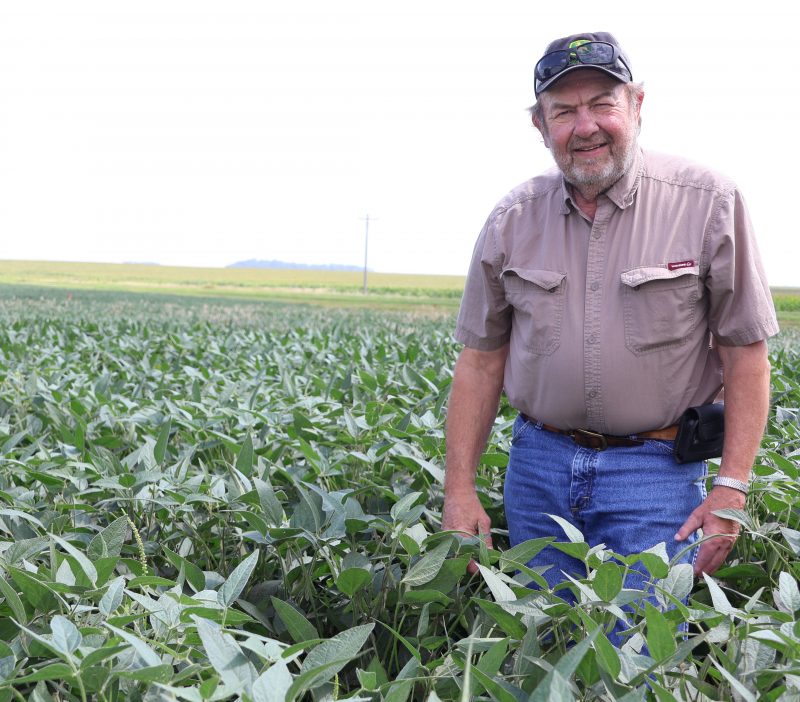Note: This is the 4th installment in the 12-part “A Sense of Where You Are” series.
Jerry and Nancy Ackermann’s context is this: for around four decades, they have been raising corn and soybeans in southwestern Minnesota’s Jackson County, a region dominated by the kind of flat, fertile fields that regularly churn out impressive yields of row crops utilizing conventional production methods. So the Ackermanns would be forgiven for pretty much raising crops the way folks always have in their neighborhood. Such production methods rely on tillage, exposed soil, and killing off weed and insect pests with chemicals.

But the Ackermanns also bring the context of being long-term stewards to the table. “I was always taught you try to leave the ground in better shape than when you took it over,” said Jerry during a late-August field day the couple hosted.
So they’ve long implemented no-till practices to protect the soil from eroding. And it became clear a few years ago that just armoring the soil wasn’t enough, that biology also needed to be built up utilizing the living roots cover crops can provide. As a result of these soil health practices, they’re seeing better water infiltration and increased organic matter levels. The farmers have also been able to maintain high yields, despite the fact that they’ve reduced nitrogen fertilizer applications over the years.
During the field day, which was sponsored by the Soil Health Coalition, Practical Farmers of Iowa, and Pheasants Forever, Jerry emphasized how less tillage and more resilient, self-reliant soil has allowed them to cut their spending on fertilizer, fuel, tile drainage, and tillage equipment.
“I look at cover crops as an investment and not an expense,” Jerry said. “I’m using the money I’m saving on fuel and labor to pay for the cover cropping, and I feel I’m still 40 or 50 bucks ahead.”
Particularly striking is how, since they’ve adopted no-till and cover cropping, the Ackermanns have experienced fewer problems with pest insects. Jerry comes across as a no-nonsense row crop farmer, one who crunches the numbers and notices cause and effect. But he made it clear that when it comes to the complex, often mysterious, interactions that result from building biological life on his farm, he’s willing to step back and just enjoy the results. In fact, his agronomist is a bit mystified at how little spraying for insect pests needs to be done on the Ackermann farm.
“Whether it’s beneficial insects that’s controlling the bad bugs or whether it’s your soil practices, I don’t know,” Jerry recalled the agronomist once telling him. “But something is working.”
Sometimes the answer is as simple as this: life generates more life. During the field day, Stephanie McLain, a soil health specialist for the Minnesota office of the NRCS, showed the results of some insect trapping she had done on the Ackermann land that week. What was particularly exciting for her was that beneficial insects that feed on the “bad bugs” were found not just in a patch of wetland habitat the farmers have restored, but in the cropped fields as well — the ecological boundaries between the domesticated and wild parts of the farm were porous.
“In agriculture, we often focus on killing things,” said McLain later. “These farmers who get into soil health realize it’s not about death, it’s about life, and it’s about building this ecosystem.”
Brian DeVore edits the Land Stewardship Letter and produces the Ear to the Ground podcast.
Give it a Listen
- Ear to the Ground 351: Less Tillage, More Money (Jerry Ackermann)
- Ear to the Ground 352: Land of the Living (Stephanie McLain)
Installments in the ‘A Sense of Where You Are’ Series:
- Introduction to the Series: A Sense of Where You Are
- Red Dresses & Magic Management
- In the Blood
- Seeking Signs of Life
- Forest for the Trees
- The Quickening
- Food Bank Booster
- First Things First
- The Big Picture
- The Snowball Effect
- 7 Years Later
- Against the Grain